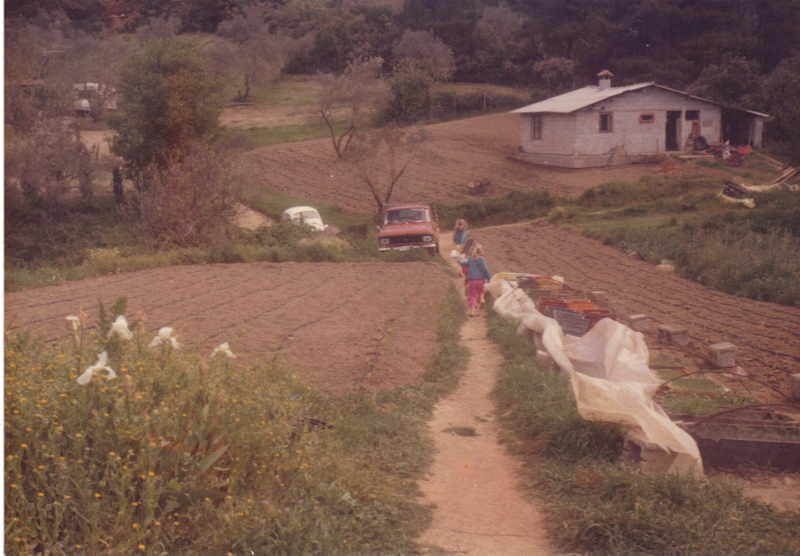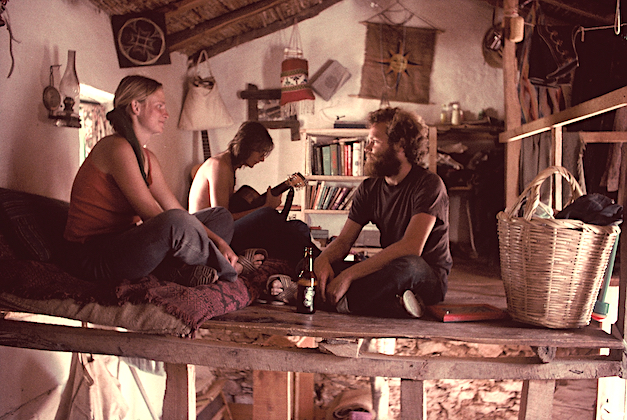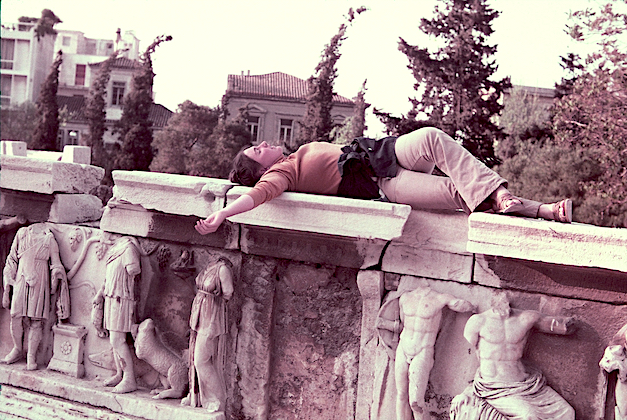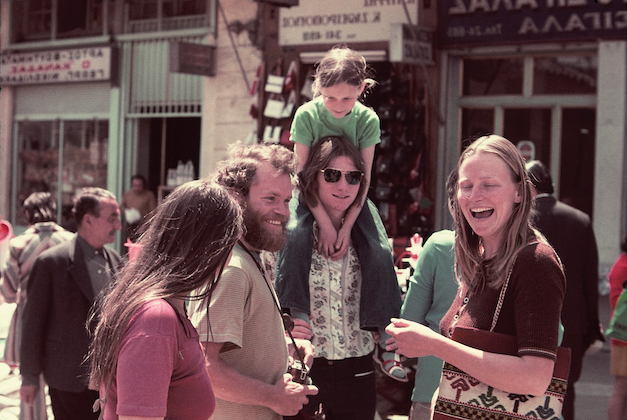
<Back to contents> <Next chapter>
3 - LAND
Back in Skiathos, it was great to be greeted by all my new friends and acquaintances
and in no time, Walt and I had found a small kalivi to stay in.
I mooted the idea of buying land and Keith and Paula said they were looking
as well and maybe (if things developed that way) we could do something together.
I spent the next couple of months looking at land all over the island. Sometimes
we would all go together if the land we were told about was quite large. Most
of the pieces on the south side, near the sea, were beyond my budget and nearly
everything else was too remote or inaccessible. I did spend a lot of time on
mule or horseback, on trails I didn’t know existed, being taken to one
plot or another, and learnt a lot about the geography of the island.
Finally, I ran into Babis by chance in a shop on the waterfront that belonged
to someone who also acted as some kind of real estate agent. Babis was the builder
that had built Erini’s parents villa and was also one of my near neighbours
at Kalivia when I had been looking after Betsy’s. Babis told me of a piece
in “Zorbathes” but said it was fairly remote, “in the middle
of the island” and was pretty overgrown. We went to have a look, driving
down the (then mud) road that lead to Aselinos and Kounistra Monastery from
Troulos. Stopping the car, we walked for about a kilometre, following a streambed
that had a lot of water in it, and finally emerged on to a spot that with a
slightly raised hill in the valley looking down on a field sown with hay of
some sort. There were olive trees on the rest of the land but they were so overgrown
with scrub that you could only see the tops of them. However, the field looked
brilliantly green and the little hill just grabbed my heart, and my mind said,
“YES, this is it!”
The plot of land was very big, some 30+ stremata (1 strema is 1,000 square metres,
4 stremata is around 1 acre) including a piece of forest, which went with the
agricultural land. This was too much for me alone and so I rushed round to see
Keith and Paula and dragged them out to see the land the next day. They liked
it as much as I did and were particularly interested in the back section that
had a very small kalivi on it. As I was more interested in the front piece with
“my” hill, it looked like we might be able to agree to purchase
it together.
We spoke (in our broken Greek) with Babis and the owner of the land, Manolis,
who gave us his price and said we would have to work with the property agent
where I had first heard of the land from Babis. As we didn’t like the
agent and were pretty sure he would rip off both Manolis and us, we refused
to deal with him and said that we were only interested in talking directly with
Manolis. This he said he couldn’t do as it would not be ethically correct.
We also said that we didn’t want the forested part of the land, as this
was useless to us. At this point, the negotiations were left in abeyance and
we kept looking around for other alternatives.
I went back to the land some days later and found Manolis starting to clear
some of the olive trees that were almost completely overgrown by the wild bushes.
I reiterated that we would not deal with the agent but only directly with him
and he shrugged his shoulders as if to say, “What can we do?” He
showed me an old footpath up to the Monastery of Kounistria and we then went
our separate ways.
Another Greek, Christo, who was not originally from the island and was married
to an English lady called Gail, tried to help us and kept suggesting to Manolis
and Babis to contact us directly and cut out the “agent”. I don’t
think this did Christo any favours with the agent but he was sympathetic to
our search for something in Skiathos.
In the meantime, Walt had become emotionally involved with a Canadian lady who
was staying with her (then) husband in one of the villas on Kalamaki. They left
and went to Canada to start living together.
I got to know Reese and Patti much better and my friendship with Keith and Paula
was deepening all the time. Paula’s family came to visit to see the land
and give their approval (or not) as Paula’s father would be the one financing
their half of the purchase. Paula had 2 sisters and a brother, Krista, Tommy,
& Sylvia, and the first night we were all together, staying in a pension
outside Volos, Krista, the eldest sister, and I took one look at each other
and fell in love. This could have complicated buying the land, but didn’t
in the end. Krista and I spent a steamy 3 weeks together, but then the family
had to return to the USA.

Keith & Paula in their kalivi (Tommy in the background)

Krista in Athens

Krista, Keith, Tommy with Sylvia, & Paula
Some weeks later, I ran into Manolis in the man street of Skiathos, Papadiamantis
Street, and he asked if we were still interested in the land. I said yes we
were and he said, alright, we will talk together, just you and me. We arranged
to meet in an ouzeri on the waterfront and we brought along Franz as an interpreter.
Manolis asked us to make him an offer and we offered him half the price he was
asking for (with no forest included) as a starting point from which to bargain.
He said simply, “andaxi” (OK). We were stunned and Franz, who recovered
quickly, said, “Grab his hand man, shake his hand now!” The deal
was struck and an ouzo was drunk to seal the bargain. Although we got the land
for half the original asking price and, compared to land prices in Skiathos
now, it was amazingly cheap, it was still expensive if one compared the it to
the prime Lincolnshire farmland in Britain that I could have bought for the
same price per acre. I am sure no local Greek would have paid as much as we
did but it was still a good price for us. Some time after we had bought the
land, Manolis himself said, “Some years ago, I would have given it away
for a piece of bread.” (We think that the money for the land seeded the
hardware shop that his son opened, and where we still shop to this day. I will
often chat with his son about how Zorbathes changed my life for the better,
and we still compare notes on growing our own vegetables.)
We went to the local notary and made a contract agreeing to buy the land and
paid a small deposit. I also gave Paula my power of attorney, as I had to go
back to Britain to get the money and send it to Skiathos, and could not be back
in time for the signing of the main contract. We had decided to buy it all together,
rather than split it into two halves as we had no real idea at that time what
we were going to do with it.
I returned to Britain and took the money, in cash, out of my account (the bank
clerk said, “Do be careful walking around with so much cash on you……..sir.”
The “sir” was difficult for her to say as she was looking at a rather
flamboyantly dressed long haired and bearded person who shouldn’t have
been ABLE to take out such a sum of money!) I then had to carry it in cash out
of the country as there were monetary restrictions imposed at the time and,
if I remember correctly, you were only allowed to take £40 out. I took
it to Amsterdam (any excuse to go back to my favourite city) and transferred
the money to Greece from there.
Whilst there, Pax and his wife Eva, Adri and Lida suggested that they come to
Skiathos for a holiday and I was enthusiastic as I wanted the share the island,
my land and my discoveries with as many friends as possible.
However, not everything went as planned with the land. Initially, it was Keith
& Paula who wanted to do the complete “back to the land” bit,
growing their own vegetables, and trying to be as self sufficient as possible.
I had no real leanings that way but I had enjoyed looking after Betsy’s
animals and growing a few tomatoes and peppers that previous summer. I was more
interested in building a house and having some place on this planet that was
mine and I could love and live on as I wished (i.e. not having my life mapped
out for me in a society that decided more or less everything for me and over
which I had virtually no say). I arrived back and went to Reese and Patti’s
kalivi. Keith & Paula were looking after it as Reese & Patti were away,
travelling. On the door was a note saying, “We are in Zorbathes”
as Keith & Paula were busy there renovating the small kalivi. As evening
was drawing in and I knew I couldn’t get to Zorbathes before dark, I decided
to sleep in the straw of one of the horse’s stables (the horses were with
Keith & Paula). I was woken up the next morning by four men, one of whom
was waving a pistol in my face and shouting (in bad English), “Where are
the trees?” I was still woozy from sleep and had no idea what was going
on. It transpired that they were plain-clothes policemen who had received a
report that marijuana was being grown on Reese & Patti’s land (true
as it happened). However, they had been told that there were plants growing
but only found some stumps (as it turned out, Keith had cut the plants down
a few days before). They finally found the plants and a tin of dried marijuana
in the shed behind the kalivi and then interrogated me about why I was sleeping
in the straw and what was the note on the door. I explained that I had just
arrived back (which fortunately I could prove by the arrival stamp in my passport)
and then explained that the note said where Keith & Paula were. We then
drove as close to Zorbathes as we could and walked the rest of the way. As we
arrived, we saw Paula with one of the horses and she shouted, “Hi Geof!”
I could only say, “We are busted!” which was probably the most depressing
thing I have ever said to a friend. Friends of friends of mine, Roy and Ingrid,
on their way back to UK from India, were staying with Keith and Paula in Zorbathes.
We were all taken down to the local police station and interrogated. Initially,
the police focussed on me as I had actually been arrested at the scene of the
crime but after a while, their attentions turned to Keith and Paula. At first,
they denied all knowledge but then they beat Keith on the bottom of his feet
and threatened to do all kinds of nasty things to Paula (this was the time of
the Colonel’s dictatorship, remember) and so Keith confessed and took
full responsibility for growing the weed. At the end of a long day, Roy, Ingrid
& I were released, but Keith & Paula were held. Keith managed to whisper
to me before we left, “There’s a large chunk of hash in a tin box
in the kalivi, see if you can stash it.” Roy and I went back to Reese’s
kalivi that night, completely spooked, as you can imagine, by any small sounds
in the night, because we didn’t know if the police had left anyone on
watch at the kalivi. They hadn’t and we found the hash and crept into
the woods above the kalivi, dug a very shallow hole, and stashed it there. (Some
weeks later, we went back to find it, but we couldn’t! It is probably
still there, somewhere in the woods, to this day.) I suddenly found myself responsible
for Reese’s two horses, Keith & Paula’s horse, and Francine,
a donkey that had belonged initially to Reese & Patti, then American Jeff,
but which he had given to Keith & Paula when he left the island. Roy &
Ingrid helped as much as possible but had to leave shortly afterwards for the
UK. Reese and Patti arrived back and we went to visit Keith & Paula in the
Larissa Jail, where they had been incarcerated. Patti said that she would cover
their legal costs and any fines that they might have to pay, but it looked almost
certain that at least Keith would have to do some time in the Greek prison system.
Their trial was held in Volos a few months later and we all shaved off our beards
and (tried to) cut our hair neatly so as to look as un-hippie like as possible.
We discovered that Reese had quite some jowls under his beard and, when I saw
him unshaven for the first time, he said, “You have two minutes to laugh!”
Keith and I hardly recognised each other at the court house with short hair
and clean shaven. It must of helped because, instead of the maximum penalty
of 21 years(!) and a huge fine, Keith received only three years and a comparatively
small fine. Paula was found “Not guilty” and was asked if she wanted
any compensation for her four months in prison waiting for the trial. The lawyers
told her not to ask for anything as the sum would just be tacked on to Keith’s
fine. (Justice, what justice?) Keith eventually stayed only 2 years in prison
as after some months in the maximum security prison in Corfu, he moved to a
work farm prison on the Halkidiki where every day he worked counted as two days
off his sentence. Being, by this time, Greek prison wise, Keith had told them
that he had been an animal doctor in the USA and was therefore put in charge
of milking the cows. This was a seven day a week job which enabled him to work
off his sentence in even shorter time. When he finally got out, he was taken
to the border and told never to return. He went to see Adri (Lida’s ex.)
in Zaandam, Holland and eventually spent all the rest of his life in Amsterdam.
He had many tales to tell, as interesting (if not more so) than mine, but unfortunately
died a few years ago. He had contracted hepatitis “C” all those
years ago in India, on his way to Skiathos, and that (with the help of a large
consumption of good Dutch beer) is what did for him in the end. Paula left,
their relationship wasn’t strong enough to withstand the long separation,
and continued her life in the States. She sent a power of Attorney to Reese
to act for her, and he and I arranged to have the land divided so that I had
the plot at the beginning of the land and she had the plot at the back with
the small kalivi on it. Eventually, I found a wealthy Englishman (who already
owned a villa on the seafront) to buy it, and Keith & Paula’s last
connection with Skiathos was severed. (They did return once, after many, many
years, but that is a story that belongs elsewhere in this book.)
All the land is now cleared of shrub (though we still have a small forested
section) and we have planted trees almost every year we have been here. We have
learned that if you plant a certain number of trees, you will lose a few, some
will remain stunted, and some will thrive, but it will be many years before
you really see and receive the benefit of them. However, the ones that survive
and thrive will be your companions for life. Even the ones that come to the
end of their life, or never produce much fruit, will warm you in the winter
months as firewood. Trees, like all living things, are to be cherished. Over
the years we have probably planted around 300 trees and I love watching them
grow. Outside all of our houses are pergolas covered in vines and the land on
the more marginal bits of our land we have planted more.
Vines are another gift of the gods (though this time it was from that old hedonist,
Dionysus). They provide good shade in the summer but drop their leaves for the
winter allowing the sun to come shining through, they will grow happily on very
poor soil, and they produce a crop that is delicious to eat but even more interesting
when fermented and turned into wine. Our first efforts at wine making were not
great. We followed the advice of Barba Mitso and other locals who told us to
clean a barrel, pour all the must into it after having trod the grapes in a
tub or tank, and leave it for 40 days. Then the barrel was sealed and, shortly
after, tapped. The wine this produces is potent but (at its best) is cloudy,
tastes of yeast, and often has a “musty” flavour. I have drunk a
lot of this in my time (in Greece you cannot refuse if someone is proudly offering
you “their own” wine) and started to understand why they would put
pine resin in it. Apart from being a preservative, it covers up a lot of sins!
We discovered that extreme cleanliness is so important in wine making. There
are already so many things that can affect a wine, pruning, weather, funguses
and diseases, timing of the picking, and a host of others, but cleanliness in
the fermenting and bottling process, is of paramount importance. Once the grapes
are picked, you can at least make sure that everything that comes into contact
with them is spotlessly clean. Most commercial growers kill the natural yeast
on their grapes and introduce commercial yeast, as natural yeast can also be
contaminated thus spoiling a wine. We however, being organically inclined, work
with what nature gives us naturally and mostly the wine is good. We use demijohns
instead of barrels for the first fermentation, as they are easy to keep clean.
The wine is then racked several times to take it off the must before bottling.
Some years are better than others. Lida is a great lover of wine, and after
lunchtime, usually has a glass somewhere within reach. She is the “wine
master” and oversees the picking, crushing, pressing, racking and bottling
of the various varieties that we have. We produce a good white and some nice
red wines, but we also produce a rosé wine that is based on a vine which
grows naturally wild on Skiathos. It is called “Korios” locally,
it produces small but abundant bunches of tiny round grapes and seems to be
impervious to all the grape’s diseases and pests. The wine that is made
from it smells and tastes strongly like strawberries, so it also has the name
“Fraoula”, which is Greek for strawberry. The locals say that it
raises your blood pressure and is therefore not good for you, but I think this
has more to do with the quantity that they drink rather than the wine itself.
We tend to blend it with other grapes to minimise “the blood pressure
problem”, but more to produce a wine that does not taste so strongly of
strawberries. However the strawberry taste is always there. It is a nice summertime
drink, especially if it is cut with a bit of water or drunk with a couple of
ice cubes. (I can hear the wine tasting fraternity turning in their graves at
the mention of “ice”!) The wine made from these grapes can also
be distilled to produce a tsipouro of distinctive (and delicious) taste. We
plant a few more vines every year as the older ones become less productive or
succumb to old age. Only the Korios in front of our door survives from the year
we built the first wooden house. Barba Mitso’s son came by that autumn
with a shrivelled stick and proceeded to dig a hole to one side of the door
in which he planted the cutting. “A house needs a vine in front of it,”
he told us, and I suspect that this vine will be there long after I am gone!
Its main trunk is thicker than my arm and its roots are in the ground under
the house and the paving stones of our patio outside, but still it thrives.
When Jacques and I were replacing the old house with the new, brick and stone
built one that we now live in, the vine kept getting in our way (in fact we
actually built around it as the new house extended past the foundations of the
old one). Jacques mooted (several times) the option of cutting it down, but
I would have none of it!
<Back to contents> <Next chapter>